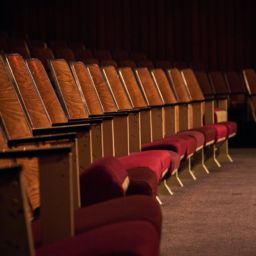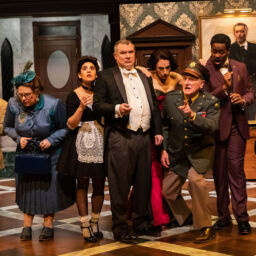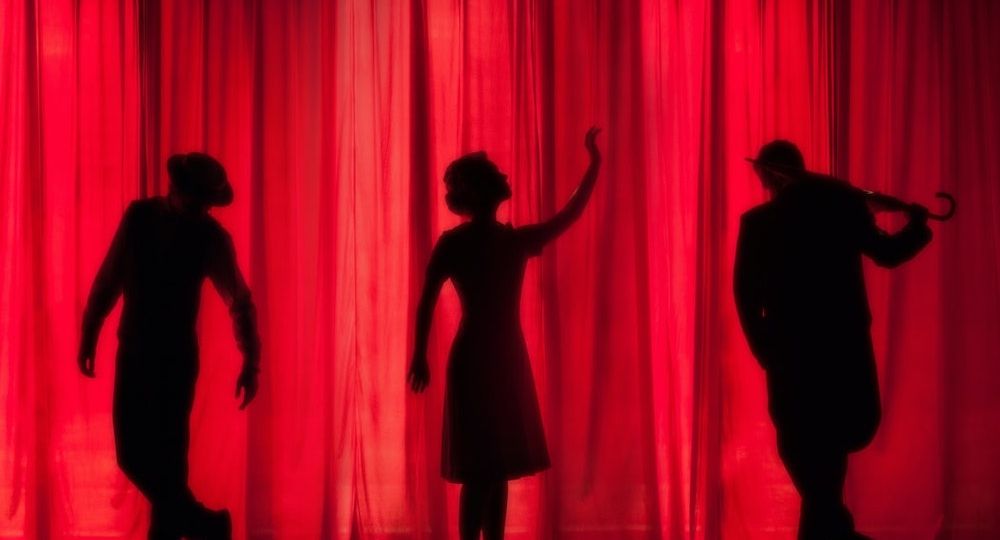
To say live theater ground to a halt last spring would be an understatement. I spoke with several leaders in the community last April, when we didn’t know then what we know now. There were bits of hope that we’d lock down for a few weeks, nip it in the bud, and return to life as we knew it (ha!) There was also an underlying fear that there might be years before a vaccine would be available.
Now, we seem to have landed somewhere in the middle. With live performances potential breeding grounds for super-spreader events, the pandemic decimated a year and a half of theatre seasons around the world. But vaccines are being administered and a new dawn is upon us. What it will look like is still slightly unclear. But one thing is for sure: Theatre will return.
We’re highlighting five local professional companies, how they came to be, and what they do to bring female-centered stories and voices to the forefront of the stage.

Jordan Schwartz began working as an administrator and teaching artist when her mentor, the late Bryan Fonseca, received a two-year Transformational Impact Fellowship from the Arts Council of Indianapolis and the Lilly Endowment to bring arts programming to the near westside. When the fellowship came to a close in 2018, they filed a 501c3 to create the Fonseca Theater Company. Now the producing director, Schwartz says FTC “exists to amplify the voices of and to celebrate the minority communities of Indianapolis through the prism of purposeful theater and civic engagement. The goal is to bring about social justice through programs which educate, illuminate, and ignite conversations on equity, diversity, and inclusion. [It] approaches diversity in the broadest possible terms including race, gender, sexual orientation, ability, and socioeconomics. We believe that it is critical to recognize intersectionality and the unique circumstances of each individual and each community when addressing the big social, political, and ethical questions of today.”
Women wear many hats at FTC. They have 100% women stage managers and 75% woman costumers lined up for this coming summer—and the board, including president Patricia Castañeda, is half female.
After a bit of a “pandemic hiatus” Schwartz is ecstatic to share that they are “opening a four-show outdoor season with social distancing protocols” on May 7th with the world premiere of Apologies to Lorraine Hansberry (You Too, August Wilson) by Rachel Lynett, followed by Quiara Alegria Hudes’ 26 Miles, King Liz by Fernanda Coppel, and Two Kids That Blow Shit Up by Carla Ching.” All four playwrights are BIPOC women. (Purchase tickets HERE.)
Indianapolis Shakespeare Company
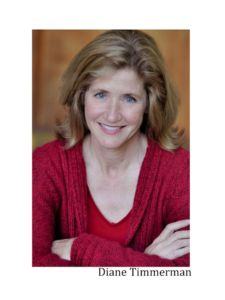 Founded in 2006 by a group of Indianapolis actors, Executive Artistic Director Diane Timmerman explains that Indy Shakes (for short) started out “as the Heartland Actors’ Repertory Theatre, producing contemporary work and new plays. Over the years, free Shakespeare productions became its galvanizing focus.” During their 2016 Lilly Endowment-funded strategic planning process, the company’s name changed to reflect that focus.
Founded in 2006 by a group of Indianapolis actors, Executive Artistic Director Diane Timmerman explains that Indy Shakes (for short) started out “as the Heartland Actors’ Repertory Theatre, producing contemporary work and new plays. Over the years, free Shakespeare productions became its galvanizing focus.” During their 2016 Lilly Endowment-funded strategic planning process, the company’s name changed to reflect that focus.
And that’s not the only thing that’s changed. Their “mainstage production is preparing to perform at the soon-to-be-open Taggart Memorial Amphitheatre in Riverside Park. Together with Indy Parks and Recreation, Indianapolis Parks Foundation, and Indiana Landmarks, [they] are building a permanent home at an outdoor amphitheatre with the Taggart Memorial as a backdrop.” A $9.2 million grant from the Lilly Endowment is to thank for that.
Women run the show at Indy Shakes, in fact they make up all of the current paid staff.
“Centering women’s voices and honoring all across the gender spectrum has come easily to our organization during these past years,” Timmerman says. “Our focus now is on centering BIPOC voices. As new residents of the Near Northwest, we are being intentional in centering African American voices as we build our board, company, and our artistic work.”
Next up they are pairing local schools with Company members for virtual “Artist in the Classroom” sessions this semester (an effort spearheaded by Shawnte Gaston). The surprise hit 2020 “Sonnet-Off” sonnet-writing competition will launch again in April. And, in the last two weeks of July, A Midsummer Night’s Dream (postponed due to the pandemic) will be performed at the brand new amphitheatre.

Founded in 1986, The New Harmony Project “exists to create, nurture and promote new works for the stage, television and film that sensitively and truthfully explore the positive aspects of life,” Artistic Director Lori Wolter Hudson tells us. The original group of theatre, film, and television professionals led by Jeff Sparks (who later went on to found Heartland Film Festival) believed there was a need to engage and support writers whose work sought a goal beyond mere entertainment, work that sought to empower and uplift.
For the last 35 years, the spring conference (held in New Harmony, Ind.) has aimed to serve writers wanting to make a difference. Recently, the Board hired full-time employees to grow the company. Lori and her husband, Executive Director David Hudson, have grown the programming from 14 to over 100 days a year. They’ve “expanded beyond the town of New Harmony to include support for artists in Central Indiana. Work over the past year has shifted to virtual support and programming, most recently with the short film project SUNRISE, which commissioned writers from across the country to write 100-300 words on ideals like hope, courage, resiliency, humanity, and community. Seven of the 17 commissions were turned into short films that can be viewed in the Sunrise Gallery.
But, of all it’s done for the female voice, it’s New Harmony’s long-standing commitment to parent-artists that stands out most, particularly after this past year. The Project offers childcare, something that shouldn’t be as novel a concept as it is. In fact, Hudson’s first job at the Project was that of a nanny one summer in college. “It was an incredible experience and modeled for me that having a family was possible in this business, which, looking back, was such an important thing for me to see at that age,” she says
They are reconvening for a conference this summer and this month they begin “an equity-centered strategic planning process, which will be a great reset after this year to assess where we’re at and dig into long-term planning and visioning for the future of the organization.”

When Executive Director Georgeanna Smith-Wade first started working with NoExit in 2007, the company was producing a couple shows a year, or “whenever there was enough money.” Founded in 2003, NoExit focused on doing “devised theatre”. Smith-Wade elaborates: “That means that we don’t start with a traditional script. We may start with source material or a question, and then the ensemble creates what the show will be. We also love working site specifically or site responsively, meaning you will seldom see us on a traditional stage. We bring performance to unusual spaces and treat the space as another ‘character’ in our play.” Since its founding, most of NoExit leadership has been women
But Smith-Wade, and NoExit as a group, believes in the collective voice. “One of the beautiful things about our work is the power of the ensemble. The ensemble is given tremendous agency to have a voice in the entire process, so even if it is not a woman in the writer’s room or directing chair, the women in the ensemble have had an integral role in the creation of the work.”
The near future is uncertain for NoExit. But they will begin devising their 2021 performance piece, an adaptation of Homer’s “The Odyssey,” and hope to engage (safely) with their audiences sooner rather than later.
Storefront Theatre of Indianapolis
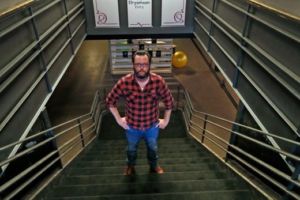
Founded in 2016, Storefront has Ronan Marra at the helm as artistic director. After a successful 14-year run as co-artistic director of Chicago’s Signal Ensemble Theater, Marra brought classic, Chicago-storefront style to 717 Broad Ripple Avenue. (The 7,500-square-foot space serves as a multi-disciplinary arts facility year-round.) Storefront focuses on new work by female and minority playwrights.
“A recent study at the time (of the founding)—commissioned by the Dramatist’s Guild—showed the vast discrepancy in professional productions provided to white, male playwrights compared to everyone else. I wanted Storefront to take a swing at that discrepancy,” says Marra.
Women play a major role at Storefront. “Women writers are a chief focus of our mission, which naturally brings more women directors, actors and designers into season planning (all but one of our programmed plays to date have been by women),” Marra tells Indy Maven. “Women are in leadership positions at every level of Storefront—our board, our staff and production-to-production as writers, directors, designers and stage managers. All of our operational and production planning and execution happens primarily with leadership and design from women, and every project brings a different set of requirements that provide varied opportunities to utilize skill sets and ideas.”
Storefront plans a “soft” reopening of their gallery in April with a multi-artist installation. Later this year, they look to resume productions of 1980 (OR WHY I’M VOTING FOR JOHN ANDERSON) by Patricia Cotter and VOICES OF YESTERYEAR by Indianapolis writer Angela-Jackson Brown. Both were postponed last year due to—wait for it—the pandemic.
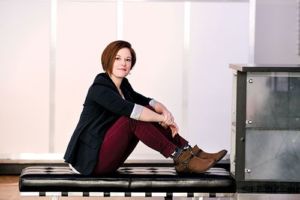
Summit Performance Indianapolis
Summit’s artistic director, Lauren Briggeman, co-founded Summit Performance following the 2016 election. “I was appalled at much of the rhetoric about women I was hearing from then-candidate Trump and others on a national stage, and really shaken by the acceptance, blind eyes, or support with which this rhetoric was received by much of our country. I thought, ‘Aside from voting, what can I do?’” She partnered with Georgeanna Smith-Wade (interviewed above for NoExit), to start a woman-focused theatre company.
Hand in hand with their mission, Summit prioritizes employment opportunities for women in theater. Briggeman tells us, “A core value of the company is to increase the representation of our country’s diverse population on and behind the stage, and that’s across every demographic—gender identity, ethnicity, race, age, sexual orientation, etc. Summit’s tagline is “By Women, About Women, For Everyone”, and that is something we think about going into every project. It’s our belief that women’s stories are humans’ stories, and when they are told well, should be compelling and of interest to everyone. After all, women and gender-diverse folx have been watching/reading/listening to/telling/relating to primarily men’s stories for forever.”
Summit, like Fonseca, is headed outside. Two live outdoor staged readings, May 21st-23rd (title to be announced next week!), and the second, “The Convent” by Jessica Dickey, will take place August 13th-15th, both held at the beautiful Allen Whitehill Clowes Amphitheatre on Marian University’s campus. All media links, announcements, as well as Covid-19 precautions, can be found on their website.
Maura Malloy is a writer, actor and one-time TedX-Talker.






